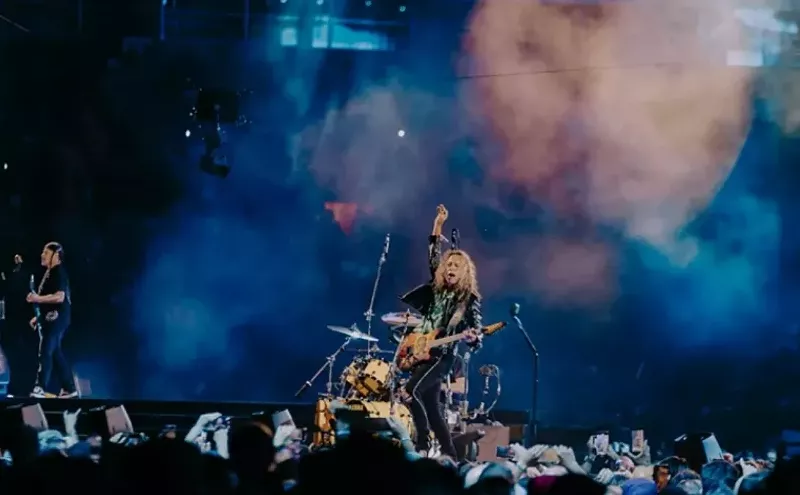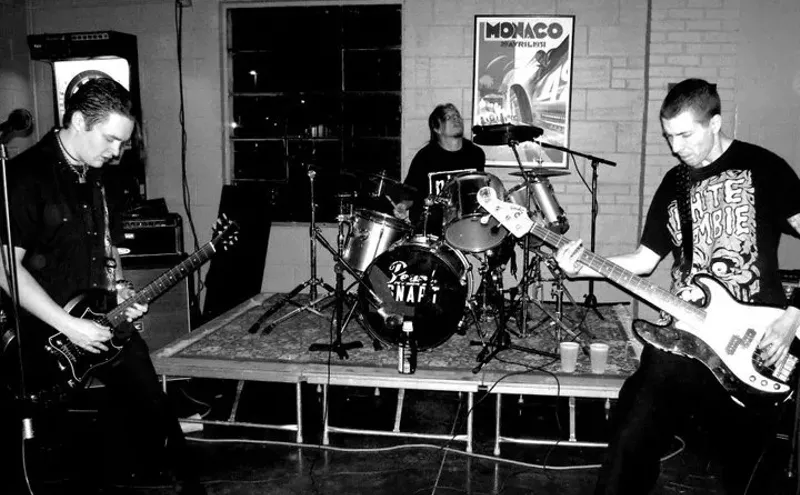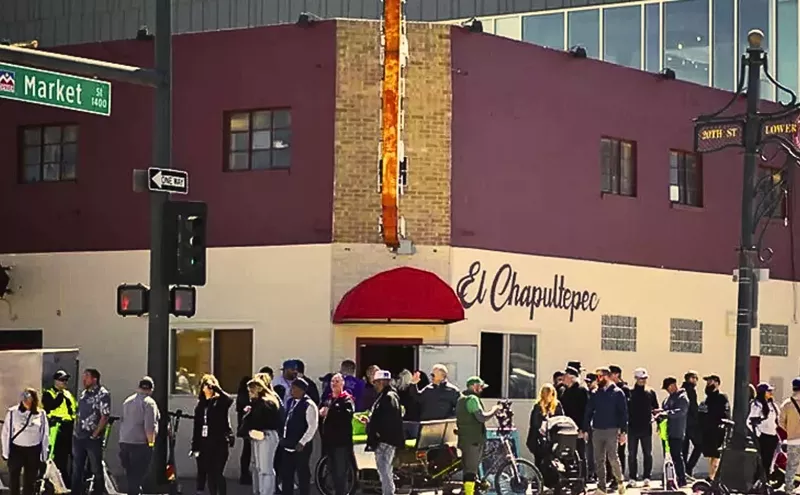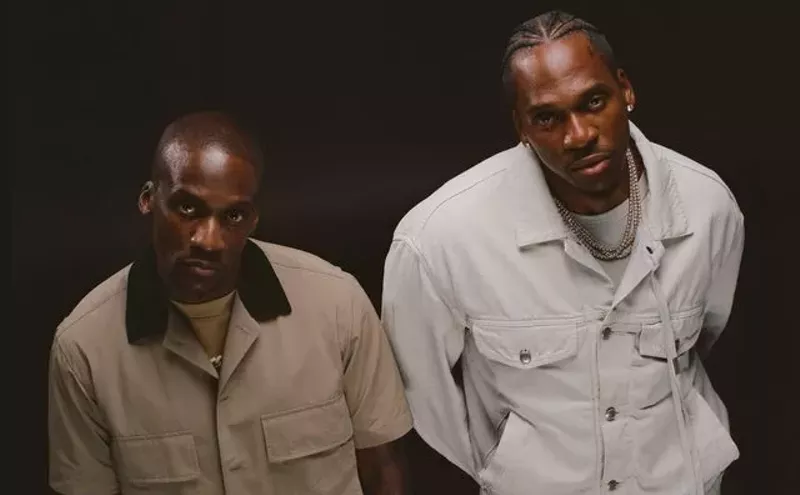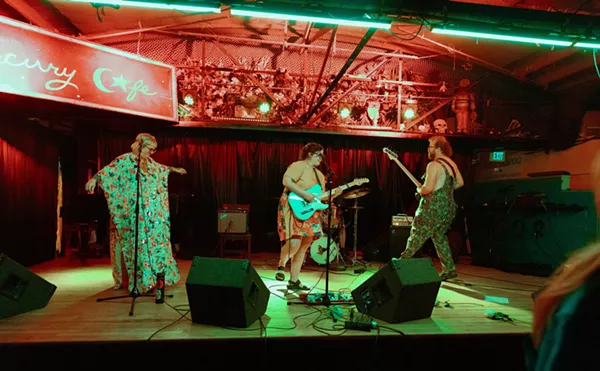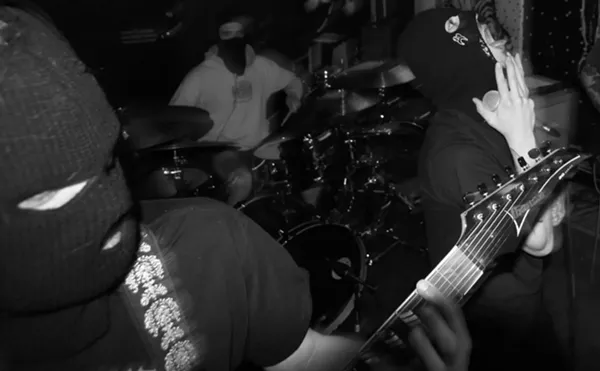If you’re looking to open and run a DIY venue in Denver, now is probably not the best time.
Within the last two months, longstanding venues Rhinoceropolis and Glob have been shuttered by the Denver Fire Department, Juice Church has taken what’s best described as an indefinite hiatus from booking shows, and the few surviving venues have gone underground, minimizing their social-media presence. Seventh Circle Music Collective was one of the lucky few, passing inspection and retaining its clearance to operate and host shows. But the general sentiment – that Denver DIY is fighting an uphill battle and, at present, seemingly losing it – remains.
That is exactly why the founders of the Hangars decided to open a DIY venue.
“We were going back and forth to see if we wanted to do it at first,” says Jeremy Marquez. “And then with all the crazy witch stuff that’s been happening, we decided we needed to.”
I’m meeting Marquez, along with venue co-founders Joel Zuercher and Logan Misegadis, at a coffee shop downtown. Marquez is slumped into a black couch, flanked on either side by Zuercher and Misegadis, all of whom are musicians and active within Denver DIY. Because of that, their motivations for opening a new venue are first and foremost personal.
“DIY is literally how I grew up. Doing this for five years, that’s all I know,” explains Marquez, the frontman of Continental Breakfast and former guitarist for Bourgeois Girl. “It’s what shaped me, not only as a musician, but as a person. Seeing this community in danger, you can’t just stand there and watch that happen.”
“It’s a true Spider-Man situation,” adds Zuercher. “If you have the ability to do something, to fix a situation, it’s your responsibility to do such. We felt it was our responsibility to give this away.”
Zuercher is referring to the renovated garage on his property that the trio has recently converted into a venue — not without some difficulty. Although the venue is located thirty minutes outside of Denver and in less danger of being shut down than those located in the city, its founders have nonetheless spent serious time combing through zoning documents, installing exit signs and fire extinguishers, and ensuring that the lighting and electrical wiring is up to code.
At present, they’re in the clear with the fire department, but they refuse to become optimistic.
“This could last for a month and then get shut down,” says Marquez.
“We could all go to jail,” Misegadis says. It's hard to tell whether he's joking.
“Prepare for the worst, hope for the best,” adds Zuercher. “You can’t help but feel paranoid, but it gives you more motivation to do it right.”
But, three shows in, the Hangars – named for the two airplane hangars adjacent to the venue – is still running. To protect the operation, the three have made it something of an invite-only operation in terms of booking and advertising shows. For the first show, which turned into a Rhinoceropolis benefit, they booked bands they personally knew: Nancy Strong, Grass, Lushing and Coo Coo Bad Brains. They created an event on Facebook, sending out the address via private message to those who RSVP’d. And then, when the time came, the organizers readied the stage, set out a carton of cookies and a giant thermos full of hot chocolate, and hoped that somebody would show up in negative-two-degree cold.
“Joel and I were nervous, because we’re setting up and nobody’s here. It’s seven and nobody’s here. We started around eight, but it was 7:25 and twenty people just showed up. It was like, all right, here we go,” recalls Marquez.
Lushing and Coo Coo Bad Brains played a joint set, alternating songs and joking that it was a battle of the bands. After finishing the final song, Lushing frontman Max Popov yelled, “Who won?” to the crowd. (A verdict was never reached.) The benefit ended up raising about $100 for the relief fund from donations alone.
“That show, from a production standpoint, was a nightmare. But the fact that we had people show up, it was positive. Nobody had a problem. There weren’t any fights. The only issue was how fucking cold it was,” says Misegadis. “I had seven hand warmers in my shoes.”
To the attendees' delight, Misegadis has since installed an industrial heater.
For Marquez, kicking off the Hangars with a Rhinoceropolis benefit felt almost too fitting. He understands how difficult sustaining DIY culture in Denver has become, especially in the wake of the Ghost Ship tragedy, which many members of the scene say prompted the sudden inspections and closures of Rhinoceropolis and Glob. Add the rampant gentrification responsible for pricing artists and musicians out, and the benefits of fostering the scene thirty minutes outside Denver city limits seem all the more apparent.
“We’re not going to wait and cross our fingers hoping for the city of Denver to lower rent,” says Marquez. “We still want art to flourish here. We still want to see the scene thrive. It’s really inconvenient, but I’m willing to do it, because that’s what we have to do for right now.”
Since that first show, the three – together with local producer Ryan Michener – have made further improvements and booked shows featuring Surf Mom, Guts, Kill Pablo Kill and Boulder's Princess Dewclaw. They’re looking forward to the summer months, when they can start hosting outdoor shows and booking longer and larger gigs. In the meantime, they’re happy to be the scene’s home away from home – especially now that they have a heater.

Audio By Carbonatix
[
{
"name": "GPT - Billboard - Slot Inline - Content - Labeled - No Desktop",
"component": "23668565",
"insertPoint": "2",
"requiredCountToDisplay": "2"
},{
"name": "STN Player - Float - Mobile Only ",
"component": "23853568",
"insertPoint": "2",
"requiredCountToDisplay": "2"
},{
"name": "Editor Picks",
"component": "17242653",
"insertPoint": "4",
"requiredCountToDisplay": "1"
},{
"name": "Inline Links",
"component": "18838239",
"insertPoint": "8th",
"startingPoint": 8,
"requiredCountToDisplay": "7",
"maxInsertions": 25
},{
"name": "GPT - 2x Rectangles Desktop, Tower on Mobile - Labeled",
"component": "24956856",
"insertPoint": "8th",
"startingPoint": 8,
"requiredCountToDisplay": "7",
"maxInsertions": 25
},{
"name": "Inline Links",
"component": "18838239",
"insertPoint": "8th",
"startingPoint": 12,
"requiredCountToDisplay": "11",
"maxInsertions": 25
},{
"name": "GPT - Leaderboard to Tower - Slot Auto-select - Labeled",
"component": "17676724",
"insertPoint": "8th",
"startingPoint": 12,
"requiredCountToDisplay": "11",
"maxInsertions": 25
}
]




